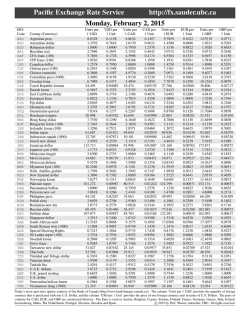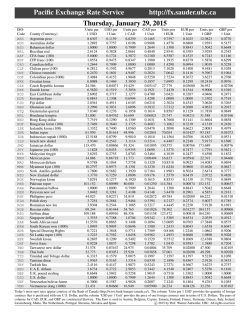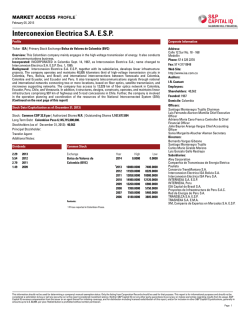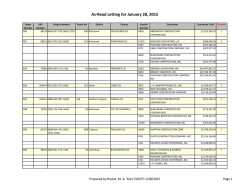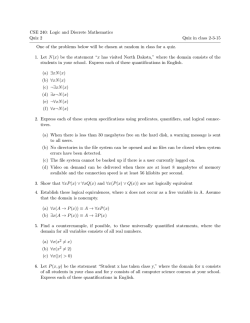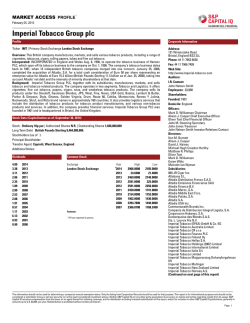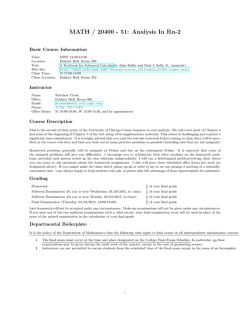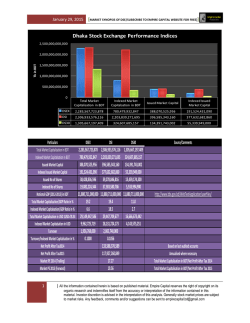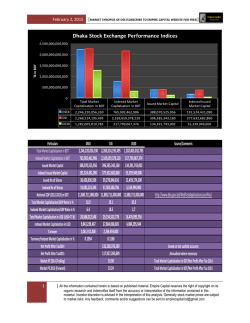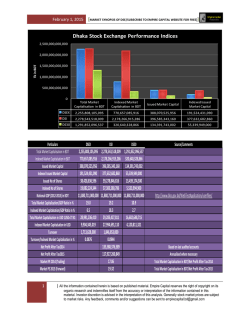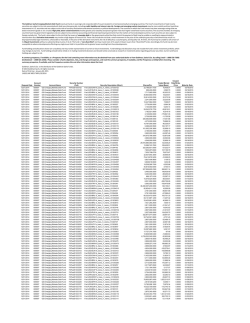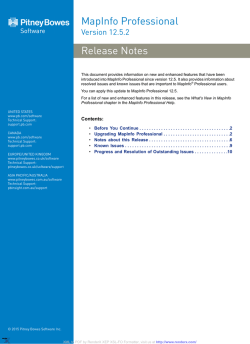
EDMS 722: Structural Equation Modeling
EDMS 722: Structural Equation Modeling SPRING SEMESTER 2015 Professor Dr. Gregory R. Hancock 1230D Benjamin Building tel: 301.405.3621 fax: 301.314.9245 Office hours Tu 3:00-4:00pm, first come first serve or at other times by appointment e-mail: [email protected] Required Course Material • Kline, R. B. (2010). Principles and practice of structural equation modeling (3rd ed.). New York: The Guilford Press. • Hancock, G. R., & Mueller, R. O. (Eds.). (2013). Structural equation modeling: A second course (2nd ed.). Charlotte, NC: Information Age Publishing, Inc. Weekly lecture materials https://elms.umd.edu (use your Testudo login to access the ELMS site) Prior to coming to class each week students are to download or print out lecture materials for that week. Materials should appear on the course website no later than midday of the day of class. Bring a laptop During some lessons we will try to run some hand-on exercises using the LISREL software. If you have a laptop, bring it to class! Or pair up with a classmate and bring one laptop between you. I will let you know ahead of time when we will be doing these activities. Course Overview This course will build upon students' knowledge of multiple regression and factor analysis by introducing them to one of the newer and more sophisticated multivariate techniques — structural equation modeling. This technique goes by many names, among them covariance structure analysis, latent variable analysis, and causal modeling, and subsumes many other multivariate methods (e.g., path analysis and confirmatory factor analysis). An understanding of structural equation modeling will be developed by relating it to students' previous knowledge of multiple linear regression and exploratory/confirmatory factor analysis. This course has as its prerequisites EDMS651 (multiple regression) and EDMS657 (factor analysis). It assumes no prior experience with structural equation modeling, and is intended as both a theoretical and practical treatment. The course will use the popular software package LISREL for examining structural models, which the students learned in EDMS657. A free student version of this package, limited to 15 variables but otherwise fairly functional, may be downloaded at: Student: http://www.ssicentral.com/lisrel/student.html Students interested in acquiring a full version (not required for this course) may either do so by renting LISREL or purchasing it: Rental: http://www.ssicentral.com/ordering/index.html#rental Purchase: http://www.ssicentral.com/ordering/index.html In general, the course will proceed through the following topics; some will take much longer than others. • measured variable path analysis (standardized and unstandardized) • confirmatory factor analysis (review) • latent variable path analysis • multi-group covariance structure models • latent means models • models for longitudinal data (e.g., panel models; repeated measure means models; latent growth modeling) • latent interactions • power analysis ___________________________________________________________________________________________________________ Formal Course Assessment Homework: There will be several assignments, each designed to give students a chance to practice the concepts learned in class. Most of the homework problems will involve using software. You are welcome to work together on homework, although you are expected to submit you own work with explanations in your own words. Typed work is much preferred, although neatly handwritten work is acceptable. You should insert relevant portions of your computer output into the appropriate places in your homework to show where you got your answers. Students should not write, "See p.136 of the attached computer printout to see where I got my answer.” Assignments should be very neat, and free from spelling, grammar, and punctuation errors. Also, please keep a copy of your work for your own protection. Assignments will be due in class unless otherwise specified in class, and should be submitted on time for full earned credit. Late work will be accepted for full earned credit if and only if arrangements are made with the instructor prior to time due. Otherwise, 10% of the points possible will be deducted for each weekday the assignment is late. Project: Based on your own data, that of a faculty member in your area, that from a journal article in your area, or that from an available database (e.g., on the web), students will develop a project with a brief write-up for an analysis involving structural equation modeling, to be presented in a class paper or poster session on 5 May. Details of this poster/paper will be given as the semester progresses. Meanwhile, students should start hunting for some data ripe for structural equation modeling. Once students have an idea, however vague, they should come see me as soon as possible. Don't wait until the last minute! Quizzes: After every two class lectures (tentatively, 10 Feb, 24 Feb, 7 Apr, 21 Apr) a short quiz will be administered. Each quiz will cover material from the lessons since the last quiz or exam (unless otherwise specified) and should not take more than 10 or 15 minutes. Students who miss the quiz will not be able to make it up unless prior arrangements have been made with the instructor. You may use one 8.5"x11" two-sided page of notes. Students should bring a calculator to the quizzes. Exams: There will be a midterm exam (10 Mar) and a (“quasi-cumulative”) final exam (12 May). For each exam, students may use three 8.5"x11" two-sided pages of notes; tables and scratch paper will be provided at the time of the exam as needed. Students should bring a calculator to the exams. Course grades This course is not graded on a curve. Homework, quizzes, and exams will be combined according to the percentages shown on the left. A worksheet for computing grades is provided. Final grades will be assigned using the scale to the right (without rounding): assessment weight Total quiz points converted to a percentage 10% Total homework points converted to a percentage 20% Total project points converted to a percentage 15% Total midterm exam points converted to a percentage 25% Total final exam points converted to a percentage 30% Unless a computational error has been made, grades will not be changed after the end of the semester. Please do not come to my office with "extenuating circumstances" for why your grade should be changed, or requesting extra credit opportunities. If you find these grading criteria to be unsatisfactory, you should seek out another SEM class on campus. overall course percent 98.0000 % — 100 % 92.0000 % — 97.9999 % 90.0000 % — 91.9999 % 88.0000 % — 89.9999 % 82.0000 % — 87.9999 % 80.0000 % — 81.9999 % 78.0000 % — 79.9999 % 72.0000 % — 77.9999 % 70.0000 % — 71.9999% 65.0000 % — 69.9999 % 60.0000 % — 64.9999 % 55.0000 % — 59.9999 % ≤54.9999 % grade A+ A AB+ B BC+ C CD+ D DF (4.00) (4.00) (3.70) (3.30) (3.00) (2.70) (2.30) (2.00) (1.70) (0.00) (0.00) (0.00) (0.00) Grades of "Incomplete": Grades of "Incomplete" will not be given for EDMS 722 except in cases of extreme emergency. Policy on auditors Student and faculty auditors are welcome in this class. They are requested not to submit work, however. Part of what allows me to have such a large class is that auditors honor this request. Thank you. Academic Accommodations In compliance with and in the spirit of the Americans with Disabilities Act (ADA), I want to work with you if you have a documented disability that is relevant to your work in this course. If you need academic accommodation by virtue of a documented disability, please contact me as soon as possible to discuss your needs. Students with documented needs for an accommodation must meet the same achievement standards required of all other students, although the exact way in which achievement is demonstrated may be altered. All requests for academic accommodations should be made as early as possible in the semester. Further information concerning disability accommodations can be obtained at http://www.counseling.umd.edu/DSS/. Academic Integrity The University of Maryland, College Park has a nationally recognized Code of Academic Integrity, administered by the Student Honor Council. This Code sets standards for academic integrity at Maryland for all undergraduate and graduate students. As a student you are responsible for upholding these standards for this course. It is very important for you to be aware of the consequences of cheating, fabrication, facilitation, and plagiarism. For more information on the Code of Academic Integrity or the Student Honor Council, please visit http://www.studenthonorcouncil.umd.edu/code.html for details. Make-Up Examinations University policy states: "An instructor is not under obligation to offer a substitute assignment or to give a student a make-up assessment unless the failure to perform was due to an excused absence, that is, due to illness (of the student or a dependent), religious observance (where the nature of the observance prevents the student from being present during the class period), participation in university activities at the request of university authorities, or compelling circumstances beyond the student's control. Students claiming excused absence must apply in writing and furnish documentary support for their assertion that absence resulted from one of these causes." No class Class will not be held on 17 Mar due to spring break. Course evaluations Your participation in the evaluation of courses through CourseEvalUM is a responsibility you hold as a student member of our academic community. Your feedback is confidential and important to the improvement of teaching and learning at the University as well as to the tenure and promotion process. CourseEvalUM will be open for you to complete your evaluations for fall semester courses starting in late November, as will be indicated in class. You will be able to go directly to the website (www.courseevalum.umd.edu) to complete your evaluations. By completing all of your evaluations each semester, you will have the privilege of accessing online the evaluation reports for the thousands of courses for which 70% or more students submitted their evaluations. Readings Here are the readings students are expected to be doing, whether or not the material is explicitly addressed in class. Because I don't know how long topics will take to cover, I can't give a detailed calendar. The best I can do is provide the following coordinated reading grid; a more complete description of the readings follows. Students should keep up with readings from all four sources. Topic Kline Hancock & Mueller Background and overview Ch. 1, 2, 3, 4 Introduction Multiple regression Measured Variable Path Analysis Ch. 5, 6, 7, 8 Confirmatory Factor Analysis Ch. 9 Latent Variable Path Analysis Ch. 10 Multi-group SEM Ch. 9, 11 Latent means models Ch. 11 Ch. 5 Growth curve models Ch. 11 Ch. 8 SEM cautions Ch. 13 Ch. 1 (lightly) Latent interactions Ch. 12 Ch. 7 Ch. 2 Power analysis Ch. 4 Nonnormal continuous/categorical data Ch. 11 Complex samples and multilevel models Ch. 12 Ch.13 Missing data Ch. 12 ___________________________________________________________________________________________________________ EDMS 722 Course Grade Worksheet Quiz 1 Quiz 2 Quiz 3 Quiz 4 Total your score: ______ ______ ______ ______ points possible: ___6__ ___6__ ___6__ ___6__ % of quiz points possible Assmt 1 Assmt 2 Assmt 3 Assmt 4 your score: _______ _______ _______ _______ points possible: _______ _______ _______ _______ Total % of assignment points possible Project Midterm Final Exam your score: _______ your score: _______ your score: _______ points possible: _______ points possible: _______ points possible: _______ % of project points possible Assessment % of midterm points possible weight decimal % of final exam points possible your % score decimal × % score Quizzes 10% .10 ______ ______ Assignments 20% .20 ______ ______ Project 15% .15 ______ ______ Midterm Exam 25% .25 ______ ______ Final Exam 30% .30 ______ ______ _______________________________________________________________________________________________ TOTAL WEIGHTED COURSE PERCENTAGE: Total weighted course % 98.0000 % — 100 % 92.0000 % — 97.9999 % 90.0000 % — 91.9999 % 88.0000 % — 89.9999 % 82.0000 % — 87.9999 % 80.0000 % — 81.9999 % 78.0000 % — 79.9999 % 72.0000 % — 77.9999 % 70.0000 % — 71.9999 % 65.0000 % — 69.9999% 60.0000 % — 64.9999% 55.0000 % — 59.9999% ≤54.9999% grade A+ A AB+ B BC+ C CD+ D DF (4.00) (4.00) (3.70) (3.30) (3.00) (2.70) (2.30) (2.00) (1.70) (0.00) (0.00) (0.00) (0.00)
© Copyright 2026
